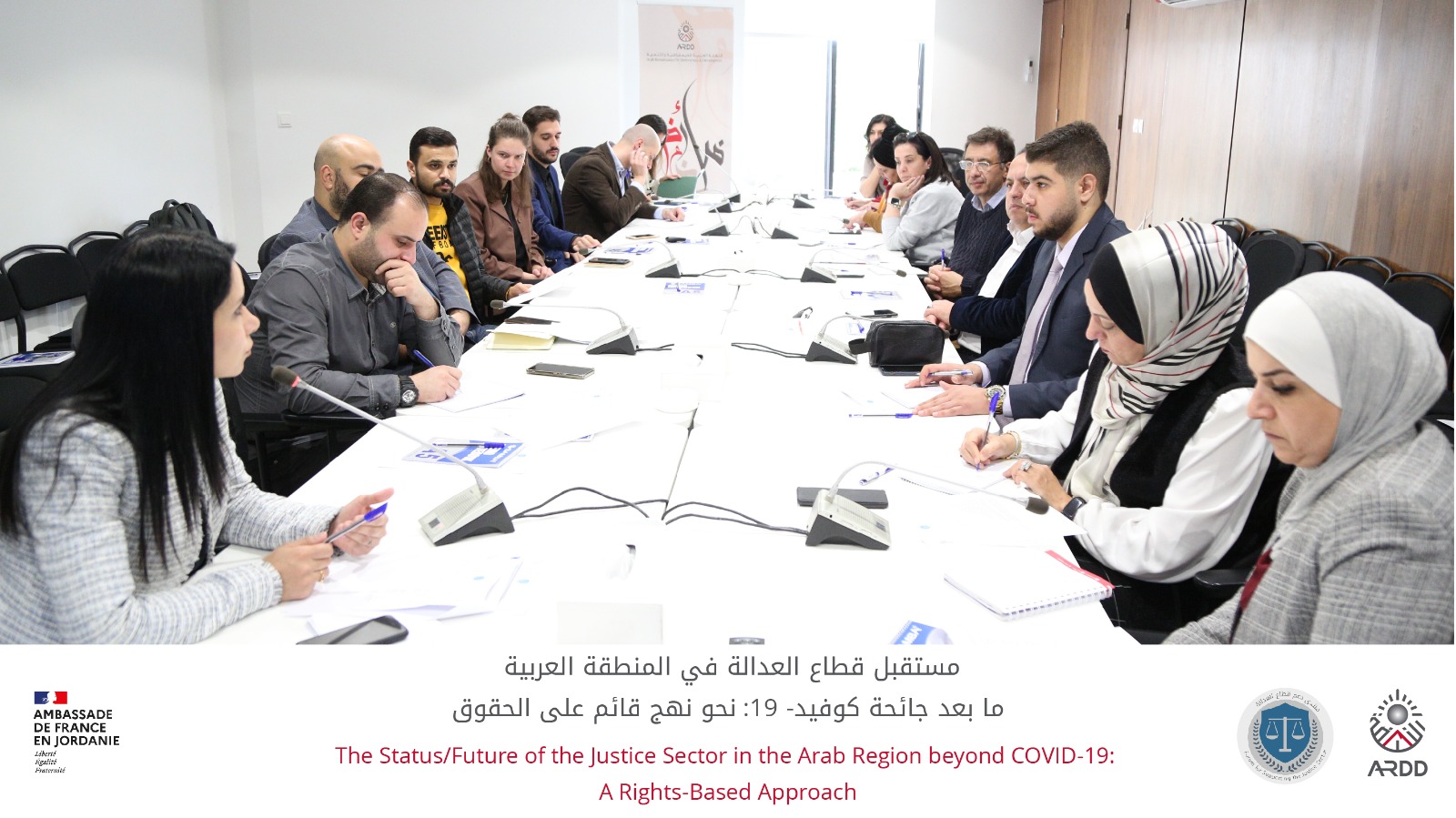Among the most important outcomes agreed upon by experts in the justice system was the need to “shift the justice sector from the private to the public, especially that strengthening public confidence in this sector is not done through strategies but rather through practices, and to emphasize that this sector is vital and that, like other sectors, it is affected by the political, economic, and social changes surrounding it.”
From this standpoint, and to understand the variables and future of the justice sector in Jordan and the Arab region -in light of the impact of this sector on many of the most vulnerable groups in society, including refugees, migrants and citizens- the Justice Sector Support Forum of the Arab Renaissance for Democracy and Development (ARDD) held a round table on Monday, March 27, 2023, on the regional research: “The Future of the Justice Sector in the Arab Region after COVID: Researching the Rights-Based Approach”.
This session comes within the framework of the project “Enhancing Public Confidence in the Justice Sector through Community Dialogue” in partnership with the French Embassy in Amman, where ARDD conducted regional research focused on three main areas: justice sector governance, the provision of justice services, and the demands for justice. The research covered Jordan, Palestine, Egypt, Lebanon, Iraq, Morocco, Libya, and Tunisia, and included three regional seminars and five local dialogue sessions that discussed cross-cutting issues related to the future of justice in the region in general.
This session came to discuss the recommendations and challenges of the justice sector in Jordan, and was moderated by ARDD CEO Samar Mohareb, who considered that the changes to the justice sector in the Arab world and Jordan started from the Arab Spring, then the COVID pandemic, all the way to the geopolitical changes in the region, underlining the need to focus on the current needs of the people and ensure their access to justice and services.
Regarding the outcomes of the regional research, Dr. Maria Lograno Nurbano, senior consultant at ARDD’s Al-Nahda Center, pointed to several challenges facing the justice sector, including: “Infrastructure, capacity building, and the impact of conflicts and problems facing the region as a whole. These challenges range from corruption to security interference in the justice systems in Arab countries, which affect their independence. The manifestations of discrimination and sectarianism also had a significant impact on the justice sector. For example, the justice sector in Palestine is affected by discriminatory laws enacted by the occupation, in terms of restricting the rights and freedoms of Palestinians.” She also pointed out the problem faced by Lebanese citizens who face are facing a dilemma with regard to economic conditions that reduce access to justice, as well as following up the needs of this vital sector.
In her review of the research findings and recommendations, researcher at Al-Nahda Center, Yusra Hassouna, stressed the importance of enhancing security and political stability in the field of the surrounding institutional environment, as well as enhancing the independence of the judiciary and the separation of powers, promoting transparency and accountability within the justice sector in order to promote and develop the work of the judiciary, and increasing the society’s confidence in it in a way that contributes to enhancing the right to access to justice, in addition to the need to spread legal awareness in society.
In the field of laws and their orientations, Hassouna pointed to the review and enforcement of the implementation of justice strategies at the national level, as well as the continuous review and update of legislation, in order to respond to the needs of society and its situation, and activate the role of alternative dispute resolution mechanisms to ensure fair access to justice among all parties, in addition to the need to work on promoting women’s rights and enhancing their access to justice.
With regard to infrastructure and human resources, Hassouna pointed out that the research recommended the need to increase the number of human cadres in this sector, especially judges, and to develop the skills and capabilities of judicial cadres regularly, with the aim of increasing judicial specialization, in addition to developing the infrastructure of the courts through new and sophisticated structures capable of providing comfort to litigants on the one hand, and facilitating their use for individuals with special needs on the other, in order to encourage individuals from different backgrounds to access justice, as well as developing and promoting clear strategies for the use of technology and digitization in this sector, and strengthening the mechanisms for providing legal aid to all individuals.
These common features and recommendations among the countries of the region were agreed upon by the participants in the session, who stressed that the independence of the justice sector is “important and necessary for all parties,” as this sector intersects with all societal issues. Hence, it is also important to focus on building citizens’ confidence in the law and its sovereignty.
As a result, these inputs are important to build on for regional research, for despite the different contexts in the Arab countries, the common features in terms of infrastructure, human resources, and required competencies are vital and sensitive, especially in light of the fast-paced current events, which require a rapid response from decision-makers to put an end to the impact of the surrounding circumstances on this sector, as well as ensuring its safety, efficiency, and independence.
The commitment of Arab States to international agreements in the field of human rights and the obligation to protect public freedoms is also required. Moreover, it is essential that decision makers listen to civil society organizations, including trade unions and human rights institutions, given their experience in the justice sector. In addition, it is necessary to promote access to justice in the broader sense, which includes economic and social rights, as well as the importance of continuous development and training of staff in this sector, as well as the importance of reducing the cost of litigation and increasing the availability of effective legal aid services.


